JOIN OUR MAILING LIST
DECEMBER 2022 PROGRAMS
THE TASTE OF JEWISH CULTURE
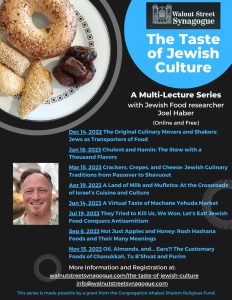
The Walnut Street Synagogue is pleased to present The Taste of Jewish Culture series beginning in December.
Please visit our event webpage for more details.
The Taste of Jewish Culture details
CHANUKAH
Menorah Lighting and “Brighter Ignited” Art Exhibit
Sunday, December 18, 6:00 pm EST
(in person at Chelsea Square, presented by the Jewish Arts Collaborative, Tobin Bridge Chabad, Temple Emmanuel and the Walnut Street Synagogue)
Chanukah 8th Night in Winthrop
Sunday, December 25, 6:00 pm EST
(in person at Temple Tifereth Israel, 93 Veterans Road, Winthrop)
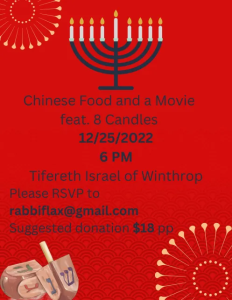
Join our friends at Temple Tifereth Israel in Winthrop to celebrate the 8th night of Chanukah with Chinese food, a movie and candle lighting. Contact Rabbi Benjamin Flax for more information and to RSVP at rabbiflax@gmail.com.
CSP
The Walnut Street Synagogue is pleased to be a partner congregation of the Orange County Jewish Community Scholar Program. Please join us at an upcoming program!
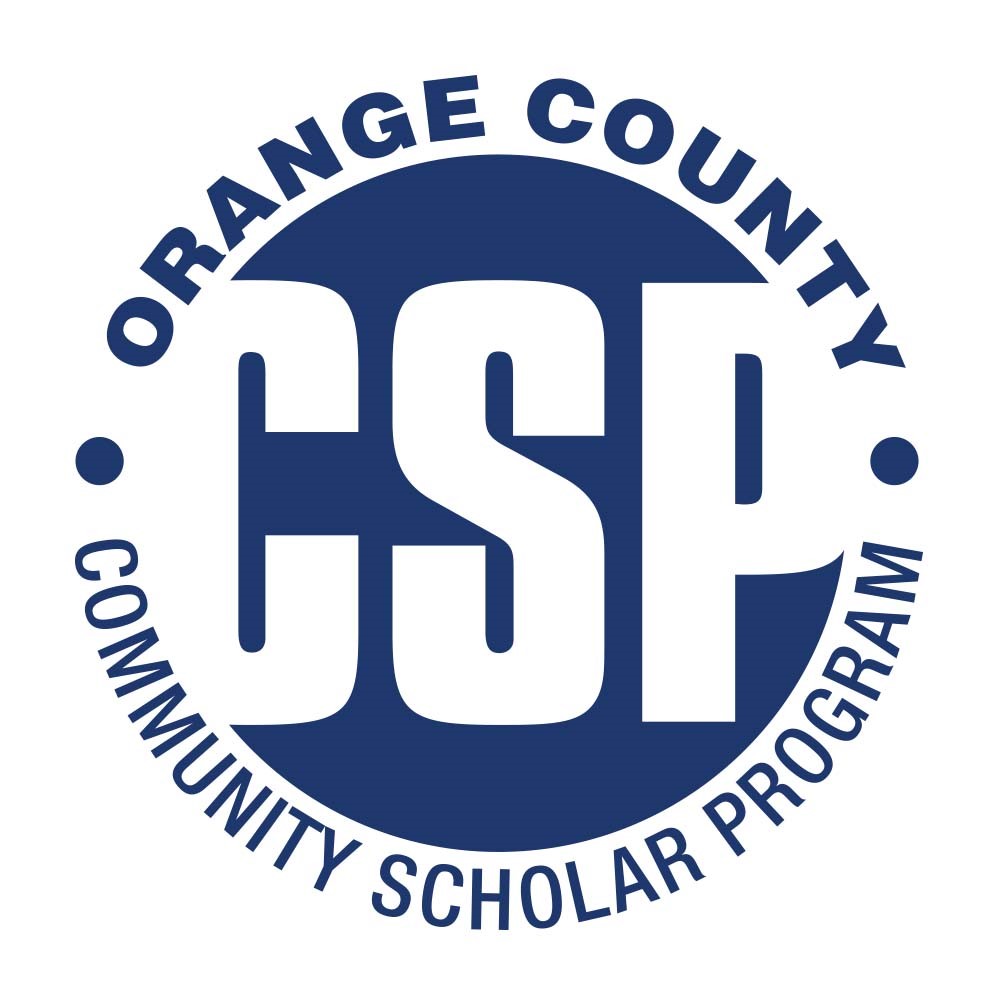
Why Was Spinoza Excommunicated?
Thursday, December 22, 3:30 pm EST
(online in partnership with the Orange County Jewish Community Scholar Program)
In July 1656, Bento (Baruch) de Spinoza was given the harshest herem (ban or ostracism) ever issued by the Amsterdam Portuguese-Jewish community. The text of the ban is full of curses upon the young man, for his “abominable heresies and monstrous deeds”. Unlike other bans issued by the community in the period, it was never rescinded. But why was Spinoza excommunicated with such prejudice? He was only twenty-three years old, not yet the famous (and “scandalous”) philosopher he would later become. In this lecture, we will consider the circumstances of the ban and use them as a way of introducing some of the major themes of Spinoza’s philosophy.
Steven Nadler is the Vilas Research Professor and William H. Hay II Professor of Philosophy at the University of Wisconsin-Madison. His books include Think Least of Death: Spinoza on How to Live and How to Die (Princeton, 2020), A Book Forged in Hell: Spinoza’s Scandalous Treatise and the Birth of the Secular Age (Princeton, 2011), The Philosopher, the Priest and the Painter: A Portrait of Descartes (Princeton, 2013), Spinoza: A Life (Cambridge, 1999; 2nd ed. 2018; winner of the Koret Jewish Book Award for Biography), and Rembrandt’s Jews (Chicago, 2003, which was named a finalist for the 2004 Pulitzer Prize in general nonfiction). He also published, with his son Ben Nadler, the graphic book Heretics! The Wondrous (and Dangerous) Beginnings of Modern Philosophy (Princeton, 2017). He has been a visiting professor at Stanford University, the University of Chicago, the University of Amsterdam, the Ecole des hautes études en science sociales (Paris), and the Ecole normal supérieure (Paris). He has also been a scholar-in-residence at the American Academy in Rome. His biography of Menasseh ben Israel was published in the “Jewish Lives” series (Yale University Press) in the fall of 2018. In 2020 he was elected a member of the American Academy of Arts and Sciences.
Program video
From the Caspian to the Caucuses: The Jews of Azerbaijan
Tuesday, December 20, 3:30 pm EST
(online in partnership with the Orange County Jewish Community Scholar Program)
Located on the southern edge of the Caucusus and bordered by Russia, Armenia, Georgia, Iran, and the Caspian Sea, Azerbaijan has a centuries-old Jewish history. Jewish communities have existed in Azerbaijan since Jews first settled in Persia. The first documentary evidence is found in Benjamin of Tudela’s Travels where he refers to more than a hundred congregations in the Haftan mountains up to the frontiers of Media, which included Persian Azerbaijan. The Jewish community of Azerbaijan includes various subgroups, mainly Mountain Jews, Georgian Jews, and Ashkenazi Jews, as well as Kurdish Jews, Bukharian Jews, among others. The Mountain Jews of Azerbaijan are neither Sephardim (from the Iberian Peninsula) nor Ashkenazim (from Germany and Eastern Europe) but rather trace their lineage to the Jews of the Persian Empire. Mountain Jews tenaciously held to their religion throughout the centuries, developing their own unique traditions and religious practices, which are infused with teachings of Kabbalah and Jewish mysticism.
Evgenia Kempinski is a Russian Jew born and raised in St. Petersburg. Her family was originally from the Pale of Settlement – Poland, Ukraine and Belorussia – and endured the suppression of Judaism in the Soviet Union then the rebirth of Jewish culture and religious life in today’s St. Petersburg. She has been an official St. Petersburg tour guide for over 15 years and is the founder and owner of St. Petersburg Jewish Tours – a company offering Jewish travelers a unique experience of showcasing the best of Russia from a Jewish point of view. She currently lives in Haifa, Israel, still keeping close connections with St. Petersburg and its Jewish community.
ParshaNut: 54 Journeys into the World of Torah Commentary
Sunday, December 18, 3:00 pm EST
(online in partnership with the Orange County Jewish Community Scholar Program)
In the spirit of Nechama Leibowitz’s classic, New Studies in the Weekly Parsha, Rabbi David Kasher offers 54 essays exploring the vast but understudied genre of Jewish literature known as parshanut, or Torah commentary. From the masters of midrash who began the tradition, to the medieval commentators who defined the style, on down to the scholars of the modern age, Kasher leads an impassioned and engaging tour through the history of Jewish Biblical interpretation. Join us for an author event with Rabbi David Kasher as we discuss his just released book – ParshaNut.
David Kasher serves as an Associate Rabbi at IKAR in Los Angeles. He grew up bouncing back and forth between Berkeley and Brooklyn, hippies and Hassidim – and has been trying to synthesize these two worlds ever since. He received his BA in Political Science at Wesleyan University, holds a J.S.D. from Berkeley Law, and Rabbinic Ordination from Yeshivat Chovevei Torah. Rabbi Kasher is a teacher of nearly all forms of classical Jewish literature, but his greatest passion is Torah commentary, and he spent five years producing the weekly ParshaNut blog, exploring the riches of the genre – with a book version soon to be released!
Program video
From the Files of the Detective Curator – Chana Orloff and The Case of the Mysterious Photo
Thursday, December 15, 3:30 pm EST
(online in partnership with the Orange County Jewish Community Scholar Program)
During research on Chana Orloff’s sculpture from 1919, a photograph was discovered in which she is recorded together with another woman and a young man (and probably another person who took the picture) in the living room of her home. They look smiling, relaxed and smartly dressed for going out together. The photo ignited Sophia Berry’s curiosity, which led her on a detective journey and research for its traces. Many questions arose: Who are the other people in the picture? Where and when was it filmed? Under what circumstances? What are the works hanging on the walls? And who is the photographer whose figure is absent from the picture but nevertheless present in the photograph? Join us to get some answers to “Chana Orloff and the Case of the Mysterious Photo.”
Since 2016, Sophia Berry has been working as an Assistant Curator of Modern Art at the Tel Aviv Museum of Art (TAMA). Currently, she is on a two-year sabbatical in Denver, CO. Her position at TAMA includes responsibilities of managing exhibitions from our collections and external loans, researching the Museum’s collections, overseeing outgoing loans, writing catalogue texts, and leading restoration projects. Sophia’s latest project was a special exhibition of works by Amedeo Modigliani in honor of the centenary of his death. Sophia has also curated a special display dedicated to Joseph Israel’s From Darkness and Light (1871), which was recently discovered to have been Jewish property before the War.
Program video
The Festival of Darkness: On the Primordial Origins of Chanukah
Tuesday, December 13, 1:00 pm EST
(online in partnership with the Orange County Jewish Community Scholar Program)
Why do all religions have a holiday in the dead of winter? When was the first Chanukah ever celebrated? And how does this explain the talmudic debate over the candles we light? Exploring the most mythic of Jewish holidays through the Bible and Apocrypha, Talmud and New Testament.
Gila Fine is a teacher of Aggada at the Pardes Institute of Jewish Studies, exploring the tales of the Talmud through philosophy, literary criticism, psychoanalysis, and pop-culture. She is also a faculty member of the London School of Jewish studies, the Nachshon Project, and Amudim Seminary, and has taught thousands of students at conferences and communities across the Jewish world. Gila’s dynamic literary method and unique intertextual approach – ranging from folktales to fiction to film – bring the stories of the Talmud to life, revealing their relevance for our time. Haaretz has called her “a young woman on her way to becoming one of the more outstanding Jewish thinkers of the next generation.”
Program video
Creating Eternal Moments: Rabbi Roly Matalon in conversation with Rabbi Elie Spitz
Tuesday, December 6, 3:00 pm EST
(online in partnership with the Orange County Jewish Community Scholar Program)
“By the time the holidays are over, maybe you’ve had a minute or five minutes or 30 seconds of something absolutely real and deep. All the hours invested are worth, in other words, the 30 seconds or the five seconds of something really, really deep — with God, with the community, with the music, with the text, with Israel, with the language. There are a million possibilities where our connection may happen. And that moment of connection is worth the hours invested because if it’s a real deep connection, there is nothing like it. It’s huge. Our culture is a culture of immediate gratification: You want it and you want it now, with the least possible money and with the least possible effort. In the spiritual world, it doesn’t really work like that. To get higher, you have to put in a little time and a little effort and you have to take the risk that it may not happen this time. We have to learn that these things take preparation, reading, thinking, coming and putting in the time.” In our one hour session, we will learn about Rabbi Matalon’s life and work and explore what it means to pursue a life of deep connection.
Roly Matalon, B’nai Jeshurun’s (BJ) senior rabbi, was born in Buenos Aires, Argentina, and was educated in Buenos Aires, Montreal, Jerusalem, and New York City. After his ordination at the Jewish Theological Seminary in 1986, Rabbi Matalon came to BJ to share the pulpit—and vision—of his mentor and friend Rabbi Marshall T. Meyer. They worked together to revitalize the congregation and turn its focus to prayer, learning, service, social justice, and interfaith cooperation. After Rabbi Meyer’s death in 1993, Rabbi Matalon became BJ’s spiritual leader. He was joined by Rabbi Marcelo Bronstein in 1995 and by Rabbi Felicia Sol in 2001. With the support of Hazzan Ari Priven, Rabbis Matalon and Sol now lead a vibrant, diverse community of 1,800 households. Rabbi Matalon’s visionary leadership has had a profound impact on the revitalization of Jewish synagogue life in the US and in Israel, his involvement in the New York, Jewish, and Israeli communities is broad and deep. He has received awards from the New York Board of Rabbis, the Jewish Peace Fellowship, the New Israel Fund, and T’ruah: The Rabbinic Call for Human Rights. Rabbi Matalon is a founding co-director of Piyut North America, a partnership between B’nai Jeshurun and Hazmanah Le-Piyut in Israel, which is dedicated to the dissemination of liturgical music from Jewish communities around the world. A student of Arabic and Turkish music, Rabbi Matalon plays the oud (Arabic lute). Rabbi Matalon is married and has two daughters.
Program video
From Andalusia to Cairo: The Life, Works and Thought of Rabbi Moshe ben Maimon (RaMBaM)
Part 4 – Tuesday, December 6, 1:00 pm EST
(online in partnership with the Orange County Jewish Community Scholar Program)
Alas, it is impossible to overstate Moses Maimonides’ influence on Judaism. At the height of the Islamic enlightenment, Moses was born (1138) in Cordoba, Spain to Maimon the judge. His family fled a decade later when the tolerant Islamic regime was overthrown by a fanatic sect. Finally settling in Cairo, Maimonides served as physician to the Sultan, Saladin, during the Christian Crusades in the Land of Israel. The product of high Islamic culture and deep Jewish learning, Maimonides transformed Jewish literature and Jewish thought. He systematized, codified, and rationalized the Jewish traditions which he had inherited. In shocking ways, he turned Judaism into a religion. This four-week course will immerse us in the family, life, times, works, and thought of Rabbi Moshe ben Maimon (RaMBaM). We’ll travel from the poetry-infused life of Andalusia to the medical clinic RaMBaM ran outside of Cairo. We’ll look at his commentary, code, philosophy, and letters. Finally, we’ll see how his son’s attraction to Sufi mysticism was both predictable and an uncanny precursor to post-Enlightenment Judaism.
Rabbi Dr. Shai Cherry serves as rabbi and Creative Educational Officer of Congregation Adath Jeshurun in Elkins Park, Pennsylvania. After eighteen years in academics, he shifted from university teaching to the pulpit in 2019. Rav Shai’s early academic research focused on Judaism and Darwinism. His first book, Torah through Time: Understanding Bible Commentary from the Rabbinic Period to Modern Times, redirected his focus from creation to revelation—how is God’s word and will understood in changing circumstances? Finally, how do we respond to what we understand to be God’s will? To address that question, he attended the Ziegler School of Rabbinic Studies and was ordained in 2009. His latest work, Coherent Judaism: Constructive Theology, Creation, and Halakhah brings these threads together to offer a vision of 21st-century Judaism. Formerly on the faculties of Vanderbilt University and the University of San Diego, he is the featured lecturer for The Great Courses’ “Introduction to Judaism.”
Program video
Princess, Poetess, Priestess, Ornament of Heaven: Enheduanna, the Women of Mesopotamia & Our Biblical Narrative
Sunday, December 4, 7:00 pm EST
(online in partnership with the Orange County Jewish Community Scholar Program)
Most ancient texts come to us without authorship or attribution, yet the first named author in history was a woman: Enheduanna (ca. 2285-2250 BCE). She was a Princess and a High Priestess in Sumer who told us the grandeur and sorrows of her life in the hymns and petitionary prayers that she wrote. Her compositions were highly valued, and therefore they were copied and re-copied in antiquity; many are thought to be early foundations of some of our own biblical psalms and hymns. We will explore the groundbreaking She Who Wrote: Enheduanna and Women of Mesopotamia currently on view (through February 2023) at the Morgan Library (NYC) and not only see the woman and her work, but we will tease out many connections to our biblical narrative that can be seen in the exhibition.
Sharon Keller, who served as CSP’s 15th Annual One Month Scholar in residence in January 2016 and who earned her doctorate at New York University (NYU) in the Department of Hebrew and Judaic Studies in the area of Bible and the Ancient Near East, is a member of the Classics faculty at Hofstra University. She has been an Assistant Professor of Bible and Ancient Semitic Languages at The Jewish Theological Seminary and at Hebrew Union College; she has also held appointments at NYU, and New York City’s Hunter College—teaching biblical text courses as well as more general courses in biblical literature and history, as well as the courses in the art and archaeology of the lands of the Bible and the ancient Mediterranean world. She has written and edited numerous scholarly articles and academic books, most of which relate to the interplay between biblical Israel and ancient Egypt. Her most popular book, Jews: A Treasury of Art and Literature was awarded the prestigious National Jewish Book Award. Known for the enthusiasm and humor that she brings to all of her talks that make otherwise esoteric subjects easily accessible, Sharon is an in-demand lecturer and adult education course instructor throughout the United States.
The Book of Revolutions: The Battles of Priests, Prophets, and Kings That Birthed the Torah
Thursday, December 1, 3:30 pm EST
(online in partnership with the Orange County Jewish Community Scholar Program)
Join us for a conversation about The Book of Revolutions: The Battles of Priests, Prophets and Kings by Rabbi Edward Feld, which tells in dramatic fashion, the epic saga of ancient Israel and illuminates the history behind the three legal codes in the Torah, which often conflict. Rabbi Feld and Rabbi Jeffrey Salkin will discuss Rabbi Feld’s conclusion that the unknown editors of the Torah deliberately left those contradictory codes in the final text to emphasize that there is not a single, correct way to practice Judaism.
Rabbi Edward Feld has published widely on Jewish theology, prayer, the Hebrew Bible, and on halachic and ethical issues. He is the author of Joy, Despair and Hope: Reading Psalms (Cascade Books) and The Spirit of Renewal: Faith After the Holocaust (Jewish Lights). He is the senior editor of the new Mahzor Lev Shalem, published by the Conservative Movement’s Rabbinical Assembly, for which he was listed as one of the Forward 50 – the 50 outstanding American Jews. He is also the senior editor of the companion volume, Siddur Lev Shalem for Shabbat and Festivals. In his distinguished career, Rabbi Feld has served as Rabbi-in-Residence at the Jewish Theological Seminary of America functioning as an advisor and mentor to rabbinical students, Rabbi of the Society for the Advancement of Judaism, and Hillel Director of Princeton University. He is a noted teacher, lecturing throughout North America. He is married to Merle Feld, a poet and playwright and Director of the Rabbinic Writing Institute.
Rabbi Jeffrey Salkin is one of American Judaism’s most prolific and most-quoted rabbis. His blog, Martini Judaism: for those who want to be shaken and stirred, published by the Religion News Service, won a 2022 Wilbur Award from the Religion Communicators Council for best religion blog of the year, as well as two previous awards. Rabbi Salkin’s essays have appeared in the Washington Post, Commentary, The Wall Street Journal, The Huffington Post, Tablet, Mosaic, Forward, and JTA. He has discussed the American political scene on CNN and the BBC. He has contributed articles to scholarly journals. His ten books discuss such subjects as bar/bat mitzvah, Israel, masculinity, and Jewish culture, as well as three Torah commentaries. He delivered the keynote on religion and spirituality at the iconic Chautauqua Institution, as well as contributing to CLE (continuing legal education) programs, and interreligious dialogues in international forums. Rabbi Salkin serves as the rabbi of Temple Israel in West Palm Beach, Florida.
Program video
YAD CHESSED

Hanukkah Lunch and Learn
Wednesday, December 21, 12:00 pm EST
(online program presented by Yad Chessed)
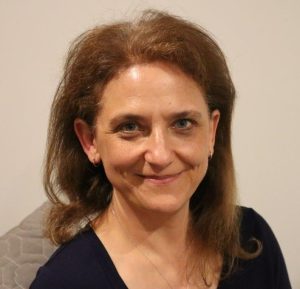
Nancy Kriegel, Yad Chessed’s Executive Director, will provide an update about her organization’s vital work in the Jewish community. The rising costs of food, housing, gas, and utilities are affecting us all, but they are particularly challenging for those who are already struggling with financial hardship. As a small, impactful social services agency with a highly focused mission rooted in the Jewish values of tzedakah (charity) and chessed (kindness), Yad Chessed provides emergency financial assistance, grocery gift cards and compassionate advice for those trying to make ends meet. Hundreds of families and individuals throughout Massachusetts rely on Yad Chessed to provide for their essentials, and even at times, a Jewish burial for a loved one.
HOW TO HELP:
Sponsor meals for those in our community who are struggling with economic hardship and isolation and help to support other needs through Yad Chessed. Yad Chessed serves as a safety net for Jewish individuals and families and is rooted in the Jewish values of kindness (chessed) and charity (tzedakah). They are committed to helping those in need navigate a path toward financial stability while preserving their privacy and dignity. Questions can be directed to info@yadchessed.org.
Support Yad Chessed
Sponsor Shabbat Hanukkah Meals
COMMUNITY PROGRAMS
Israel at 75
Part 2 – The Influencers: David Ben Gurion, Golda Meir and Yitzhak Rabin – Tuesday, December 13, 7:30 pm EST
Part 3 – The Influencers: Menachem Begin, Shimon Peres, Ariel Sharon, and Benjamin Netanyahu – Tuesday, January 10, 7:30 pm EST
Part 4 – Israel Today: The Promise of a New Government – Tuesday, February 7, 7:30 pm EST
Part 5 – What’s in Store for Israel’s Next 75 Years? – Tuesday, March 14, 7:30 pm EDT
(online series presented by the Lappin Foundation)
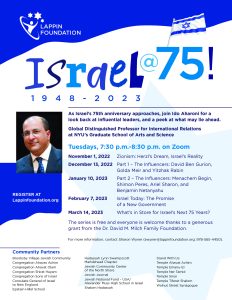
The Walnut Street Synagogue is pleased to be a community partner of the Israel at 75 series, presented by the Lappin Foundation. In advance of Israel’s 75th anniversary, Ido Aharoni, Global Distinguished Professor for International Relations
at NYU’s Graduate School of Arts and Science, will look back at influential leaders and take a peek at what may lie ahead. Everyone is welcome thanks to a generous grant from the Dr. David M. Milch Family Foundation.
Israel at 75 (Event flyer)
Hanukkah: The Festival of Lights
Thursday, December 15, 5:00 pm to 10:00 pm EST
(in person event at the Museum of Fine Arts, Boston)
Join the Jewish Arts Collaborative (JArts) at the Museum of Fine Arts for Hanukkah: The Festival of Lights. The program partners with local artists and communities to create an unforgettable evening of performance, education, craft and artistic engagement for all ages. Attendees will pay a discounted $5 admission upon entry to the museum.
